The Old Tilers Talks first published in 1925, by Carl Claudy, is a series of short anecdotal stories told in the setting of a new member asking an old tiler for his opinion on various masonic topics.
These short articles are still very relevant, 100 years on, and hopefully provide some insight to new members today.
“I can’t just see the idea in founding this new Masonic library,” objected a comparatively newly made Master Mason, talking to a group in the anteroom during refreshment.
“Books are all right, of course, and libraries are necessary, but why insist on such a complete library for the new Temple?”
“Well, why not?” asked someone.
“If you follow out the idea to its logical conclusion,” answered the new Master Mason, “the Elks ought to have a library and the Knights of Pythias ought to have one.
The I.O.O.F. should support a library and the Red Men should have one, too. All the hundred and one fraternities should have libraries and the curious spectacle would be presented of a hundred groups of a few hundred men each, each supporting its own little collection of books.
Wouldn’t it be much more sensible if they all supported one big collection?”
There was a moment’s silence. The group turned questioning eyes to the Old Past Master.
“We already support one big collection of books,” the Old Past Master began. “All of us here present contribute our quota towards the support of the city library.
In practically every town of any size in the nation is a local library, which all support by their proportion of taxes.”
But the general library for the general run of people is naturally general in character. It will have books on science and history and travel and adventure and mathematics and botany and business and poetry and art….a great many books on a great many subjects, but no authoritative collection on any one subject.
The doctor may use the library for general purposes, but when he wants the last word, he goes to his medical library.
The lawyer may use the general library for one purpose or another, but it is either his personal law library or that of his Bar Association which he depends upon for accurate information in regard to a knotty point of law.
“A Masonic library may partake of the character of a general library, in that it may have a lot of fiction and current literature.
It serves Masons in that way, just as the coffee and sandwich at refreshment serves him.
The Lodge isn’t and doesn’t pretend to be, a restaurant, but it gives him something to eat to make his visit pleasant.
The Masonic library isn’t, and doesn’t pretend to be, a competitor of the city library, but it gives him some fiction and some current literature to serve him at his pleasure.”
But the main purpose of a rightly conducted Masonic library is to convey knowledge to its owners and users. Masonry makes much of the liberal arts and sciences; not to provide the means by which Masons may learn of these is for Masonry to fail in practicing what she teaches.
The Masonic library is poorly conceived and ill furnished which contains only books upon Masonry. A doctor’s library which had books only upon office practice and business systems would be of little help to the physician.
The Masonic library which has only Masonic history and philosophy, offers but little to the true seeker of light. A Masonic library should be a library of all knowledge, including a great deal on Masonry, but as much on philosophy, science, religion, art, history, that its users have the opportunity to learn.
In the capital of this nation is America’s largest and finest collection of books; the Congressional Library, second only to the library of the British Museum in size, and with its volumes far more accessible to readers than that of the English library.
But that doesn’t prevent the Ancient and Accepted Scottish Rite for the Southern Jurisdiction from maintaining one of the very finest Masonic libraries in the world.
In the great House of the Temple are a hundred thousand books. They are not all books on Masonry, though the Masonic collection is world famous.
It is a general library, of general knowledge. Incidentally it contains a wonderful Burnsiana collection, the largest collection of English translations of Goethe’s Faust in the world, as well as the priceless Pike manuscripts, some of them not yet in print.
Yet in spite of this there is a Grand Lodge library in the capital of the nation, for the use of Master Masons, and the local Scottish rite bodies got up a library of their own, by asking members for unwanted books.
“I think every Order should have its own library. I see no reason why Elks and Red Men, Pythians and Odd Fellows, should not find equal benefits from libraries of their own.
But there is this distinction; Masonry is old, old. It is worldwide. Its history is the history of the world.
Its philosophy is the philosophy of all ages. With not the slightest disrespect for the various other fraternal orders, it may truthfully be said that none of them has the lineage, the extent, the spread, the history or the intimate connection with knowledge that is Masonic pride.
Therefore, Masonry has, perhaps, an especial need for books, and books, of course, mean a library.”
Something has been said about including books in lighter vein in Masonic libraries. I think they should be included.
One gives candy to a child to make the taking of medicine easy. We supply entertainment and refreshment to make attendance at specially vital meetings, easy.
Why not the inclusion of books of purely entertainment character to make the use of the library easy to those who know little of libraries ?
As those who once came to scoff remained to pray, so it is often the case that the man who starts browsing in a library after light fiction remains to examine, and be interested by, works of real information.
“So, my brethren, I believe we should support our Masonic library to the limit; I believe we should make sacrifices for it, help it, use it.”
Masonry has only gentle methods at her hand for the working out of her great purposes. We wield no battle-axe and carry no sword.
But….the pen is mightier than the sword, and the book is but the printed thought which some man penned. Education is Masonry’s greatest tool; and books are at once the foundation and the superstructure of education.
“I wish I could learn to think first and talk afterwards,” said the newly made Master Mason. “I am for all the help we can give.”
“You see,’ smiled the Old Past Master, “even talking about a library has help our brother’s education.”
Article by: Carl H. Claudy
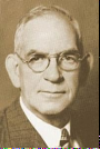
Carl Harry Claudy (1879 – 1957) was an American author, magazine writer, and journalist for the New York Herald.
His association with Freemasonry began in 1908, when, at the age of 29, he was raised a master Mason in lodge Harmony No. 17 in Washington, DC. He served as its master in 1932 and eventually served as Grand Master of Masons in the District of Colombia in 1943.
His Masonic writing career began in earnest when he became associated with the Masonic service Association in 1923, serving as associate editor of its magazine, The master mason, until 1931.
Under his leadership the service Association was brought to a place of predominance through his authorship and distribution of the short talk bulletin which made his name familiar to virtually every lodge in the country.
 Old Tiler Talks - Eyes Lifted High The Old Tiler Talks first published in 1925, by Carl Claudy, is a series of short anecdotal stories told in the setting of a new member asking an old tiler for his opinion on various masonic topics. These short articles are still very relevant, 100 years on, and hopefully provide some insight to new members today. |
 Old Tiler Talks - Masonic Libraries The Old Tilers talks first published in 1925, by Carl Claudy, is a series of short anecdotal stories told in the setting of a new member asking an old tiler for his opinion on various masonic topics. These short articles are still very relevant, 100 years on, and hopefully provide some insight to new members today. |
 Old Tiler Talks - So Many Rascals "Why are there so many rascals in the Fraternity, and why don't we turn them out?" a new member voiced to the old tiler for his opinion. These short articles are still very relevant, 100 years on, and hopefully provide some insight to new members today. |
 Old Tiler Talks - The Greatest Work The Old Tiler asked, "what is the greatest work of Masonry?" The New Brother sat by the guardian of the door and pulled out his cigar case. - Another instalment of wisdom by Carl Claudy, The Greatest Work |
 Old Tiler Talks - Why Men Love Freemasonry The 'Old Tiler Talks' first published in 1925, by Carl Claudy, is a series of short anecdotal stories told in the setting of a new member asking an old Tiler for his opinion on various Masonic topics. These short articles are still very relevant, 100 years on, and hopefully provide some insight to new members today. |
 Old Tiler Talks - Seeking a Little Light The Old Tilers talks first published in 1925, by Carl Claudy, is a series of short anecdotal stories told in the setting of a new member asking an old tiler for his opinion on various masonic topics. These short articles are still very relevant, 100 years on, and hopefully provide some insight to new members today. |
 The new mason laments that practically speaking, Masonry is a failure, and it depresses me … Masonry cannot be a failure, because men fail as Masons. The Old Tilers talk by Carl Claudy |
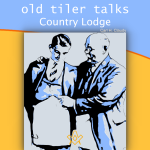 Old Tiler Talks - Country Lodge A lesson in the importance of an open mindset to observe, not to judge, but to learn and accept that we can achieve the desired outcome employing a different process. by Carl Claudy |
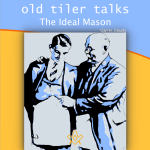 Old Tiler Talks - The Ideal Mason "What's your ideal of Freemasonry?" asked the Younger Mason - A short anecdotal story told in the setting of a new member asking an old tiler for his opinion on various masonic topics by Carl Claudy |
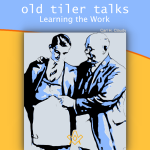 Old Tiler Talks - Learning the Work A short anecdotal story told in the setting of a new member asking an old tiler for his opinion on various masonic topics by Carl Claudy |
 Masonic first appointments and promotions might appear to be inequitable for one point a view, but some times, one point does not show the whole picture. A perfectly articulated story by Claudy, we should not compare one persons abilities with another. |
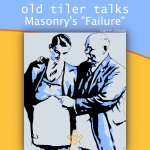 Old Tiler Talks - Masonry's 'Failure' Masonry fails because it doesn’t interest men sufficiently to make them practice what they preach. A perfectly articulated story by Claudy Masonry does not fail men. Men fail Masonry. Masonry has the teachings. |
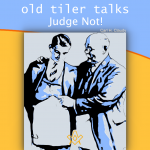 A perfectly articulated story by Claudy reminds us of a lesson from the Second Degree Charge; in the decision of every trespass against our rules, judge with candour, admonish with friendship, and reprehend with mercy. |
 Old Tiler Talks - A Masonic Speech A Masonic Speech - I can tell you the essence of appeal. It is drama. If you want your hearers to hang on your words, dramatize your subject |
 Old Tiler Talks - A Mason's Christmas A Mason's Christmas - Do you believe in Christmas celebrations should be held by the lodge ? Should members be asked to contribute to one and engage in Christmas festivities ? What is the old tilers take on this ? |
 Advertising - We would do more good in the world if we advertised ourselves more… Why ? |
 Uncover the mystery behind one of the oldest and most widespread symbols denoting God. |
 Do you want to discover the originals of the five points of fellowship ? |
 The mystery behind the two great pillars that stood at the porchway entrance of King Solomon Temple |
 Three numbers, what are their masonic significance? Pythagoras has something to say about them |
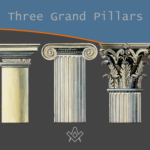 What are the Three Grand Pillars ?, wisdom, strength, and beauty - then later we hear of the Doric, Ionic, and Corinthian columns |
 This emblem contains more real food for thought than any other in the lecture of the Sublime Degree. |
 The Hiramic Legend is the glory of Freemasonry; the search for that which was lost is the glory of life |
 How are the Fellowcraft's five steps connected the five senses of human nature |
 How to explain the principle tents of the craft to a newly made brother |
 What are the lesser lights and where are they placed on our Lodges |
 Like so much else in Freemasonry the Middle Chamber is wholly symbolic |
 In the true sense of the words Freemasonry is not a secret society but a society with secrets. |
 Three Great Lights – the Volume of the Sacred Law, the Square, and the Compasses |
 Entered Apprentice Lambskin Apron; More ancient than the Golden Fleece or Roman Eagle, more honourable than the Star and Garter ... |
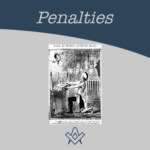 To the initiate, the penalty in his obligation comes with a shock of surprise and sometimes consternation. |
 What is a point within a circle |
masonic knowledge
to be a better citizen of the world
share the square with two brothers

click image to open email app on mobile device









